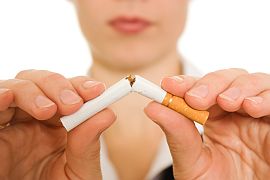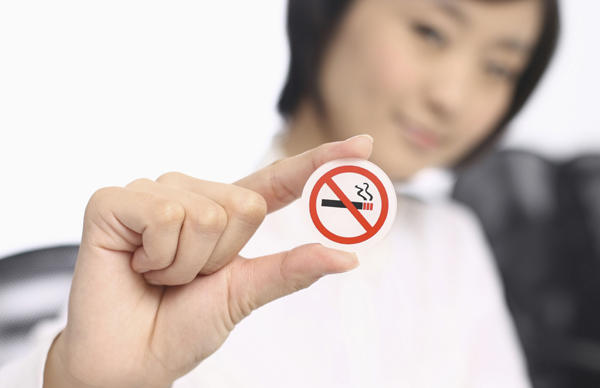Can Smoking Make PCOS Worse?
As with many other conditions, Polycystic Ovarian Syndrome (PCOS) can be exacerbated by certain lifestyle choices. Also known as Stein-Leventhal Syndrome or PCOD (Polycystic Ovarian Disorder), this condition occurs when a woman’s body produces an excessive amount of androgens, or male hormones. The result of this hormonal imbalance is a collection of both physically and emotionally painful symptoms that can prove difficult to overcome. A staggering amount of women suffer from this endocrine imbalance, and smoking can make it much worse by provoking some of its symptoms.
Polycystic Ovarian Syndrome (PCOS) can be exacerbated by certain lifestyle choices. Also known as Stein-Leventhal Syndrome or PCOD (Polycystic Ovarian Disorder), this condition occurs when a woman’s body produces an excessive amount of androgens, or male hormones. The result of this hormonal imbalance is a collection of both physically and emotionally painful symptoms that can prove difficult to overcome. A staggering amount of women suffer from this endocrine imbalance, and smoking can make it much worse by provoking some of its symptoms.
While smoking is unhealthy for everyone, tobacco use is especially unhealthy for women with PCOS. More adverse health outcomes are reported by women with PCOS who smoke than those who have avoided or given up the habit. In short, quitting smoking is one of the best lifestyle modifications you can make when managing your PCOS, along with improved diet and exercise.
Symptoms
Similar to other syndromes, Polycystic Ovary Syndrome has a diverse list of symptoms that vary from woman to woman. In fact, the experience that any given woman has with Sclerocystic Ovarian Syndrome can be completely different from the experience of another. Your symptoms may range from invisible to highly noticeable, from painless to painful
Polycystic Ovary Syndrome has a diverse list of symptoms that vary from woman to woman. In fact, the experience that any given woman has with Sclerocystic Ovarian Syndrome can be completely different from the experience of another. Your symptoms may range from invisible to highly noticeable, from painless to painful
- Anovulation: This occurs when your ovaries fail to release an egg. Without the release of an egg, conception cannot occur. This symptom is invisible and painless, but it can cause other symptoms that are more noticeable.
- Irregular or Absent Menstrual Periods: Often caused by anovulation, the absence of a regular menstrual cycle is both an annoyance and a serious health concern for you, as it can lead to endometrial cancer, or cancer of the uterus.
- Infertility: Perhaps one of the most emotionally difficult symptoms of ovarian disorder is infertility, a common result of anovulation. If you’re a woman whose ovaries don’t release eggs then you may experience difficulties conceiving, which can be devastating to you and your partner.
- Hirsutism: A very visible and oftentimes embarrassing symptom is hirsutism, which is excessive growth of hair. If you experience this symptom may see it on your face, arms, legs and other abnormal locations.
- Thinning Hair: Often compared to male pattern baldness, Polycystic Ovarian Syndrome (PCOS) sufferers may experience hair loss or the thinning of the hair.
- Weight Gain: Another very embarrassing and emotionally difficult symptom is weight gain, which can also lead to more serious health problems. If you’re overweight, you’re at a greater risk for other health issues, like heart disease and diabetes.
- Acne: Frequently found on the face, chest, and back, acne can be painful and embarrassing when you suffer from Polycystic Ovary Syndrome. This acne can range from mild to severe.
- Acrochordons: Commonly called skin tags, acrochordons are harmless flaps of skin. They do not cause any medical problems, but they may be uncomfortable depending upon their location on the body. Unlike many of the other symptoms on this list, your dermatologist can easily remove acrochordons.
- Acanthosis Nigricans: This symptom is often sparked by the leading underlying cause of Polycystic Ovarian Syndrome (PCOS), Insulin Resistance. Acanthosis nigricans creates dark, thick folds of skin that have a similar texture to velvet. These patches of skin most often develop along your neck, groin, underarms or other creases of your skin.
Women who have PCOS are also at a higher risk of developing more serious health conditions, including
- Diabetes
- Heart and Blood Vessel Diseases
- Endometrial Cancer (Cancer of the Uterus)
- Sleep Apnea
Causes
Before you can explore PCOS management, it helps to have an understanding of how it’s caused. You already know that Polycystic Ovarian Syndrome (PCOS) is a hormonal syndrome; however, what you might not know is that the condition is really about insulin. Particularly, it’s all about Insulin Resistance (IR).
is a hormonal syndrome; however, what you might not know is that the condition is really about insulin. Particularly, it’s all about Insulin Resistance (IR).
When your body loses its ability to properly take in and utilize glucose from the blood stream, the ramifications are fairly dire. When Insulin Resistance isn’t treated properly, it can eventually develop into diabetes or Metabolic Syndrome. This same loss of insulin sensitivity can also lead to imbalance in your hormones and lead to PCOS (Polycystic Ovarian Syndrome). This hormonal imbalance is what ultimately leads to so many different symptoms. So clearly, PCOS treatment starts with understanding Insulin Resistance.
Natural Therapies
While there is no cure for Insulin Resistance there are PCOS natural treatment plans that can impact your health for the better. In order to combat hyperinsulinemia, which is a form of pre-diabetes, it’s suggested you make a series of changes to alter the way their bodies interact with insulin. If you’re a woman who’s fighting these health issues you’re encouraged to make the following lifestyle changes:
- Eat a healthy, well-rounded diet. It’s suggested if you have Polycystic Ovary Syndrome eat a diet that is high in non-starchy vegetables. Additionally, it is encouraged that you moderate carbohydrate intake and avoid simple carbohydrates, fats, and sugars.
- Exercise often. Because Polycystic Ovarian Syndrome (PCOS) can cause weight gain, which can lead to other health problems, maintaining a healthy weight is important in fighting these disorders.
- Get enough sleep. Sleep allows the body to restore itself and can contribute to weight loss. By getting six to eight hours of sleep every night, you can improve your overall wellbeing.
- Learn about these disorders. Being prepared to fight both of these syndromes means being educated about the risks they impose. By understanding PCOS and Insulin Resistance, you can fight them more effectively.
- Quit smoking. Smoking can contribute to heart disease and can cause blood clots in women who are taking birth control pills. Because birth control pills are often prescribed to help control anovulation and irregular menstrual periods, this can be a major concern. Plus, studies in Denmark have shown smoking is associated with increased adrenal responsiveness, decreased prolactin levels and a more adverse lipid profile in patients with polycystic ovary syndrome.4 In short, smoking negatively impacts your heart, blood, nervous system, sexual gratification and nursing ability… to name a few side effects.
Treatment Options
Smoking is a highly addictive activity that has damaged the health of countless men and women around the world. The first step in fighting for one’s health is to kick the smoking habit and work toward building a healthier lifestyle. But how does quitting Smoking contribute to your battle against Polycystic Ovary Syndrome specifically?
has damaged the health of countless men and women around the world. The first step in fighting for one’s health is to kick the smoking habit and work toward building a healthier lifestyle. But how does quitting Smoking contribute to your battle against Polycystic Ovary Syndrome specifically?
Atherosclerosis occurs when cholesterol, calcium, and other substances accumulate along the arterial walls of the body. Once accumulated, this plaque can build up and cause damage in the form of blood clots, heart attacks, and stroke. Furthermore, a reduction in blood flow to the extremities can result in gangrene if not properly addressed.
Atherosclerosis is often caused by hypertension, or high blood pressure, and high cholesterol. Unfortunately, cigarettes can cause both blood pressure and cholesterol to rise:
- Smoking does not directly cause hypertension, but it can exacerbate the problem if it has already developed.
- Smoking can actually decrease high-density lipoprotein cholesterol, referred to by many as the “good” cholesterol, and increase low-density lipoprotein cholesterol, also known as “bad” cholesterol. Doing so can increase the risk of atherosclerosis and, as a result, the risk of heart attack, stroke, and blood clots.
In addition to causing these issues, Smoking can actually set the scene for heart and blood vessel disease. When the endothelium, or the inside layer of the artery, is damaged, cholesterol and other plaque-forming substances can more easily accumulate. As they do so, the diameter of the artery narrows. This narrowing forces the same amount of blood through a smaller space, which can increase blood pressure. When in the bloodstream, nicotine and carbon monoxide, which are byproducts of Smoking, can cause damage to the endothelium. This way, Smoking can both cause and exacerbate heart disease.
Women, especially minority women, are already at an increased risk for heart disease because they’re fighting Polycystic Ovarian Syndrome (PCOS). When you add Smoking it can greatly impact their health in a negative way. For this reason, if you’re a smoker, it’s recommended that you quit smoking as soon as possible. Not only is Smoking damaging in general, it can increase the already high risk of heart disease and blood clots for PCOS
PCOS Treatment from Insulite Health
Are you looking for PCOS natural treatment plans? Be sure to see what Insulite Health has to offer. As pioneers in natural, lifestyle?based remedies for PCOS we’ve helped countless women meet the challenge of Insulin Resistance. Be sure to explore our educational resources, blog, forum and support groups to see if our natural PCOS System might be your key to optimal health. Insulite Health is dedicated to helping you feel better and possibly reversing your PCOS so you feel more in control of your health.
“5 Steps You Can Take Today to Manage PCOS,” About.com, 16 April 2009, http://pcos.about.com/od/pcos101/tp/5steps.htm (12 January 2012).
“Smoking and Atherosclerosis,” About.com, 10 July 2011, http://quitsmoking.about.com/od/heartdisease/a/atherosclerosis.htm (12 January 2012).
“Smoking is associated with increased adrenal responsiveness, decreased prolactin levels and a more adverse lipid profile in 650 white patients with polycystic ovary syndrome.” Department of Endocrinology and Metabolism, Odense University Hospital, Odense C, Denmark. March 2012
http://www.ncbi.nlm.nih.gov/pubmed/21770838
“Ethnic differences in Rotterdam criteria and metabolic risk factors in a multiethnic group of women with PCOS studied in Denmark.” Department of Endocrinology and Metabolism, Odense University Hospital, Odense C, Denmark. December 2010.
http://www.ncbi.nlm.nih.gov/pubmed/20846294
Next Steps
- Take the PCOS Quiz! Get your score and assess your hormone health risks.
- Join our Facebook Sisterhood Group Pose your questions to this group of like-minded women. Get the answers to your questions and the support you need.
- Checkout the Hormone Reset. Guided Practices to eliminate anxiety, lose weight and boost energy.
We are committed to helping women reverse their symptoms of hormone imbalance – a major cause of excess weight gain, adult acne, unwanted facial hair, depression, anxiety, and heartbreaking female infertility.
©Insulite Health empowers women with hormone imbalance to transform their lives through a process of healing with the Natural Hormone Solution –a complete solution for helping women reverse the symptoms hormone imbalance..

